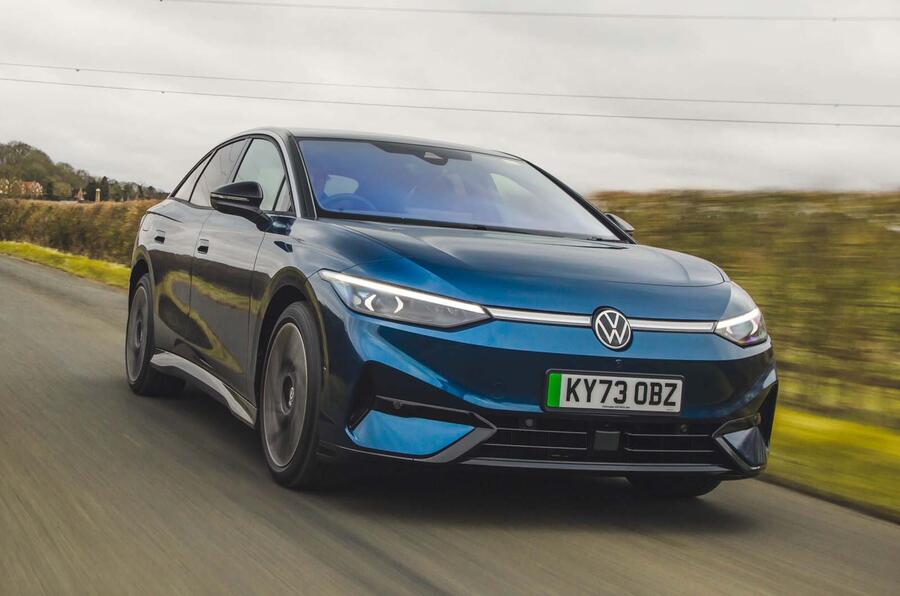So then, the new Volkswagen Passat eHybrid is a really good plug-in hybrid. It will do 73 miles on electric power at 3.6mpkWh, then carry on using its petrol engine while still doing over 50mpg a lot of the time, and it’s pretty hard to argue with that, right? Allow me…
I’m not about to dispute any of the findings of that test – because I wrote it – but in my view, the concept of a PHEV is fundamentally flawed. That new VW system is pretty remarkable and makes the Passat a very competitive PHEV. But even this one just seems like the worst of the electric and pure-ICE worlds.
Some people choose a PHEV as a company car to get the low BIK tax even though they can’t slow charge it while doing something else (like sleeping or working).
If that’s you, I don’t blame you, because that’s how our tax system operates at the moment (although it will become much less favourable to PHEVs from 2028).
But at that point, it’s a loophole rather than the right solution. After all, the mild-hybrid version of that Passat is several thousands cheaper, gets about the same fuel economy and is overall slightly more natural to drive.
The Passat can use DC rapid chargers, but those are so expensive that you would be better off just running it on petrol.
If you do have the ability to charge it regularly, then why not get a proper electric car? You’re going to be running the hybrid on the battery and electric motor most of the time anyway, while carting around a redundant engine.
In the case of the Passat, that means you have 108bhp at your disposal – adequate, but not exactly a near-£50,000 experience. Meanwhile, the Passat’s electric counterpart, the ID 7 Tourer, has more than double, at 282bhp.
I’m as partial as anyone to a flat six and a manual gearbox, but I’ve no love lost for a thrashy four-cylinder with an automatic – that’s just a means to an end.
With more power that’s smooth and silent to boot, as well as a more entertaining rear-drive chassis, the ID 7 is a better driving experience all round.
Ah, “but the range and the charging infrastructure”, you say. In our road test, we found the ID 7 will do a real 277 miles on the motorway, after which it will charge back up to 80% in less than half an hour.








Join the debate
Add your comment
I drive a PHEV and it works well for me. I regularly travel about 30 miles and can recharge at both ends. However I regularly need to travel further afield and also tow a trailer from time to time.
A PHEV is certainly not the worst of all worlds.
The point about carrying the dead weight engine around when driving on electricity is not limited to PHEVs. Fully electric cars carry the dead weight of battery capacity which is often not fully utilised. The weight of a PHEV battery plus an engine is often not much different to a large EV battery and its large metal casing and cooling system.
The point about deep discharging a PHEV battery regularly is nonsense. Internally PHEV batteries are never fully discharged. The car only charges the battery to 90% and discharges it to around 20% to ensure a long life.
The author also talks about how good rapid charging now is for electric cars, but then goes on to criticise the DC charging of the Passat Hybrid because it would cost more than petrol. This surely also means that fast charging a full EV costs more than petrol.
The PHEV is therefore ideal. It allows you to use cheaper home charging, but then use fuel when further afield.
Because PHEVs are far cheaper than EVs, depreciate far less and are actually usable on road trips without having to keep a second car around for that purpose. There'll be a day when EVs can do everything including replacing my diesel estate, but it won't be for least another 10-15 years.
Fully agree with some of the earlier comments. We have had a full EV and 3 PHEVs in our household, (and lots of different petrol cars). We got rid of the EV because of shocking depreciation, (thankfully, we had bought it on PCP, so were partially protected from the depreciation), and shockingly poor winter motorway range. The PHEVs have all been the perfect balance for us. Might go full electric one day, but not yet.